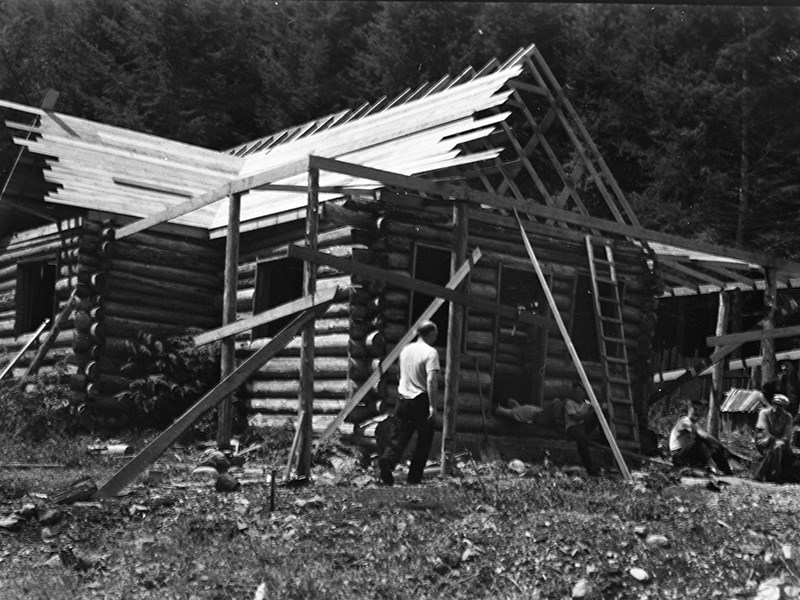Previous chapter [“The war years,” October 11]: As a result of the Second World War, for the first time in her life, Nancy left her wilderness home in Okeover Inlet for the long walk to work at the Powell River mill. Even though she was often homesick, town life treated her well. That was until one spring day in the late 1940s, when she was returning home to Okeover Inlet for the weekend, when disaster struck.
At first, Nancy smelled it. Then she saw it. A thick, black column of ominous smoke rose above the treeline. She scrambled up the trail to the top of a hill and looked down in horror upon her family’s homestead. The cabin they had called home since 1927 was engulfed in flames.
With her heavy .303 rifle bumping against her back she rushed and slid down the steep trail to their clearing as fast as she could. Her goats and chickens were panicking, running around freely, and her dogs were whimpering at the edge of the orchard. Someone, either her mother or father, had let the livestock loose from their pens should the fire spread.
Nancy came barrelling around the front of the cabin to find her parents rushing to and from their well and with a bucket and a washbasin to try and douse the flames. Nancy immediately thought of the ocean water that buttressed their homestead isthmus on two sides, but as fate would have it, the tide was out. The water’s edge was more than 150 feet away down the rocky beach.
Nancy’s father William, whose vision was very poor, shoved the washbasin into Nancy’s hands. Then he surged into the burning cabin to try and retrieve whatever he could. He emerged a few seconds later, choking in smoke, clutching a leather folder stuffed full of documents in one hand and a screeching, clawing cat in another. He tossed the cat to the grass and it bolted into the bushes.
Nancy’s father tried one more time to enter the burning cabin but the heat was too intense. The buckets of water were useless. Instead, they turned their attention to dumping water onto the sides and roofs of their out buildings. The fire roared out of control. It totally consumed the house they had built with their hands, and had called home, for 22 years.
It was over quickly. Within 30 minutes the entire cabin was a smoldering, flattened, black-charred mess. They lost almost everything except the clothes on their backs, a few pots and pans, the documents William salvaged and Nancy’s new rifle. Everything else was gone: a life’s worth of memories, photos, and possessions. But Nancy and her parents had survived, and so had their animals.
There was one other piece of luck on their side. On a lousy day, the winds whipped across their isthmus from the southeast with tremendous force. On pleasant days, they were mostly protected by the prevailing winds from the northwest. On the day of the fire, by chance, there was no wind at all, which stopped the fire from spreading to their other buildings, or worse, the forest that surrounded them.
Neighbours who had seen the smoke began arriving by boat, and the close-knit inlet community immediately came together to help the Crowthers. Families such as the Larsons, the Hendersons, the Roos and the Parkers all showed up offering whatever they could in the form of food, clothes and shelter.
Within a week, the Crowthers and their neighbours began the work of building a new, larger and sturdier log cabin for the family. They collected and split logs to build the house from standing dead snags so there was no drying out or shrinking after the cabin was built.
When the log cabin was completed, it was a beautiful five-room home with large windows that looked out the front to the beach and the bay, and out of the back to the garden and the woods.
It’s this cabin that still stands on the little isthmus on the shore of Penrose Bay in Okeover Inlet, now owned by the Vallance family of Powell River Sea Kayak, and they spend every spring and summer living in it, along with many weekends throughout the year.
As of 2019, the Crowther log cabin is 70 years old.
In the late 1940s, with a grand new cabin and a need to replace all of their kitchenware, beds, furniture and appliances, the Crowthers needed money. More than Nancy made at the company store during the week, and more than her parents made from digging clams or selling eggs and honey.
While building the new cabin, Nancy’s father came up with a farming idea with his neighbours. It would be for a new crop that would change the course of history for Okeover Inlet and Desolation Sound: oysters. Harvesting that crop would also lead “Cougar” Nancy into a bizarre bare-knuckled brawl.
That’s in the next chapter of the Cougar Lady Chronicles.
Grant Lawrence is an award-winning author and a CBC personality who considers Powell River and Desolation Sound his second home. Portions of the Cougar Lady Chronicles originally appeared in Lawrence ’s book Adventures in Solitude and on CBC Radio. Anyone with stories or photos they would like to share of Nancy Crowther are welcome to email grantlawrence12@gmail.com.



